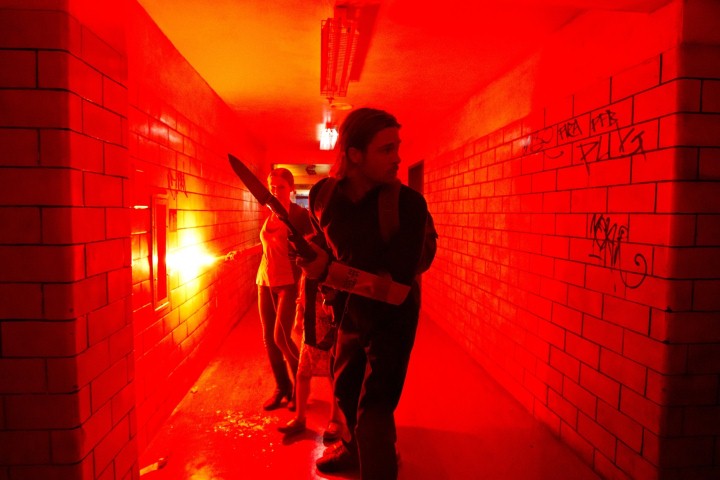The movie version of World War Z is a pretty solid translation of the book World War Z. I’ve heard some people didn’t like it? Alex gave it a pretty big blah. Personally, though, I think it worked, because it focused on the spirit of the text, rather than the letter of it. It certainly worked for me as an audience member, and as a film, an adaptation, and a tweak on the nose of the genre. Part post-apocalypse, part plain old zombie flick, and part New Macho action-adventure—in which the sensitive family man retired UN investigator is the tough guy—I think a lot of the shade being thrown at it is undeserved and ultimately I think that the choices the movie made are absolutely in keeping with the themes of World War Z, the book. I’ll tell you why. Be warned that I’m going to talk fairly loosely about spoilers—not specific ones, but rather the big arcs and movements of the film.
First and foremost, I think that telling an entirely original story for the film is a perfect direction to take things. World War Z, the book, is an oral history. A collection of shorter stories, told as anecdotes, that paint a broad canvas and allow the reader to piece together a big picture. Something like that is hard to translate to the screen—an ambitious director could have tried, especially if she or he could have made it a mini-series rather than a film—but I don’t have any problem with the decision to follow a single protagonist. For me, that is completely in keeping with the tone of the book. I didn’t see it as trying to be “this is the entirety of the book, translated to screen,” but rather vice versa: “what you see on the screen could be one of the stories in that book.”
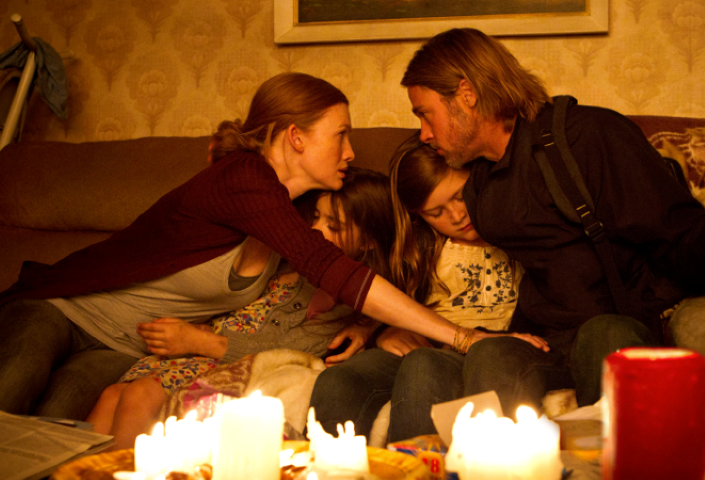
The downside of this approach is that the movie never quite makes up its mind about Brad Pitt. He’s a cross between an Everyman and a hyper-competent disaster survival specialist, which is tricky to pull off. They aim for “just a regular guy with a unique set of skills,” but they ended up missing the mark a bit and hitting the trope of a featureless protagonist. Yes, he loves his family, and crying little kids is always a good kick in the ribs (just ask Children of Men, which used that trick to the point of abuse) but other than the fact that he retired to be with his family, we don’t know or discover much about him. Navidson, from House of Leaves, is a similar cipher, but that book plays on his obsession and family ties to tell a story about him. If you asked me to tell you anything about Gerry (Brad Pitt’s character) besides his job and his family, I’d come up blank.
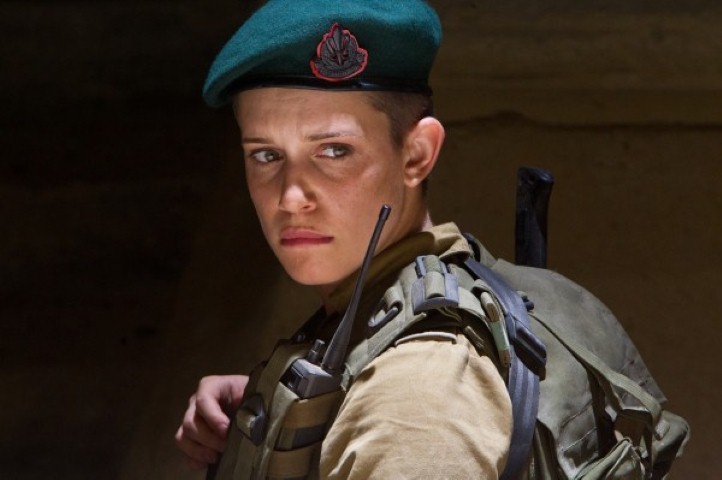
The structure of the novel, however, definitely informs the movie version, and for the better. The family is not just trying to escape Philadelphia in the middle of a zombie outbreak; they hit a range of high points—apartment buildings, drug stores, military bases—before separating from Brad Pitt’s character. At that point, Pitt pinballs back and forth between locations; from an aircraft carrier to South Korea, to Israel, to Wales. Not quite the breadth of the books—which includes, you know, underwater as a major location—but it does show that the scope of the concern is global. Here is meets characters that widen the film’s appeal by providing new angles through which to view the story: the bald headed Segen helps dilute the overly macho cast by having a tough female character who brings a military viewpoint, and the cast of the WHO play a convincing spread of paranoia and bravery from the perspective of the medical establishment. Moreover, Brad Pitt’s character visits these places for intelligible reasons. In a world of Nolans and Shyamalans, it is a real relief to have a movie where people’s behavior isn’t utterly obfuscated and stretched thin to cover up plot holes.
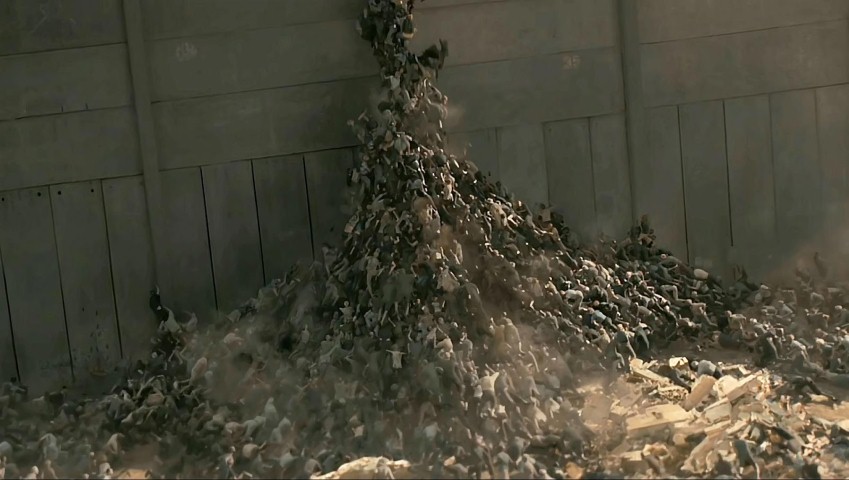
You know from the start—just by the fact that the book you are reading is a history of the zombie war—that humanity wins. I quoted Marvel’s Ultimate Galactus a while back, but a different part of that story sticks out to me now, in this regard: after facing down a huge, extinction level event, Nick Fury says “the human race can kick the hell out of anything.” Which brings me to the crux of the matter, for me: the film version of World War Z had a happy ending. I’ve heard rumors that the original ending was as banal and grim as I’ve come to expect from these end of the world flicks; a paean to nihilism that shows just how “adult” it is by engaging in a juvenile display of feel-bad storytelling. Oh, you’ve commodified women’s sexuality, how bold! That is sarcasm, if you couldn’t tell over the sound of my eyes rolling all the way back in my head and rattling in my skull. Remember the mess that was 28 Days Later’s third act?
A happy ending is important to World War Z, because the book has a happy ending. Humans win; they win because humans are clever and zombies are stupid. They win because people get organized and communicate. They win, in essence, because humans are the best they can be. In a post-apocalyptic setting, it is easy to show humans acting at their worst. We see it in the film of World War Z during the looting and in the cold, hard decision made in evicting the protagonist’s family from the military ships when they lose contact. There the bad side makes its appearance, but here is where World War Z steps up its game: that isn’t the only side of humanity we see.
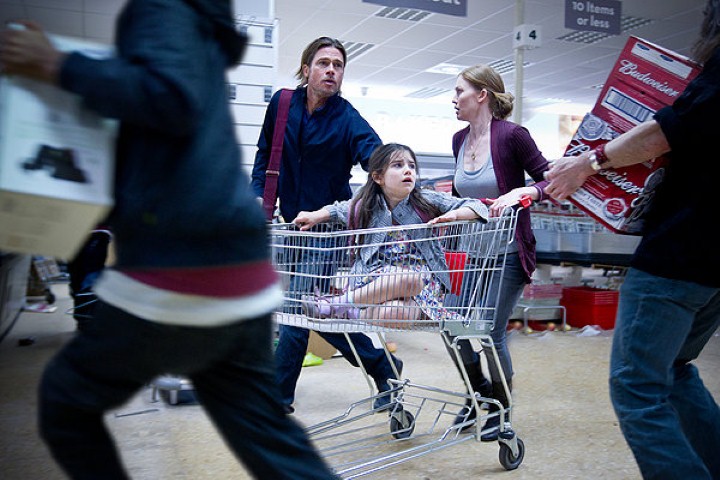
In both the book and the film, we see that there is plenty of room between relentlessly grimdark and innocent naivety. There is a vast middle ground where people can work together and use their brains to change the world. Between the ape and the angel, so to speak. We’ve heard the adage that there will only be peace on Earth when there are aliens for humans to join together and fight. Well, in World War Z those “aliens” are the dead, and while zombies sure take a bite out of the human species, the human species regains its footing. That is verisimilitude for you. Humans behaving…like humans. To me, that concept is central to the book, and I think the film captured it—which is far more important to me than hitting any particular plot point from the novel.
Mordicai Knode wants you to leave him behind if he gets bit. Don’t mercy kill him; he might get better or become a Zombie King, you don’t know. You can find him on Twitter and Tumblr.










